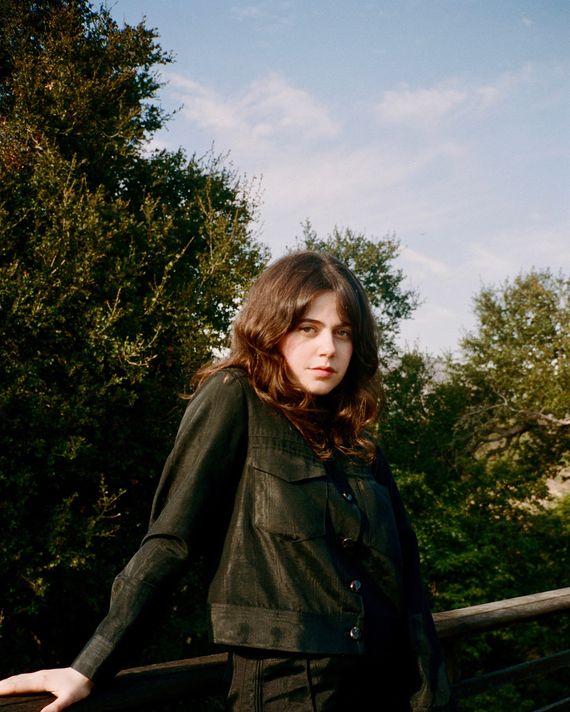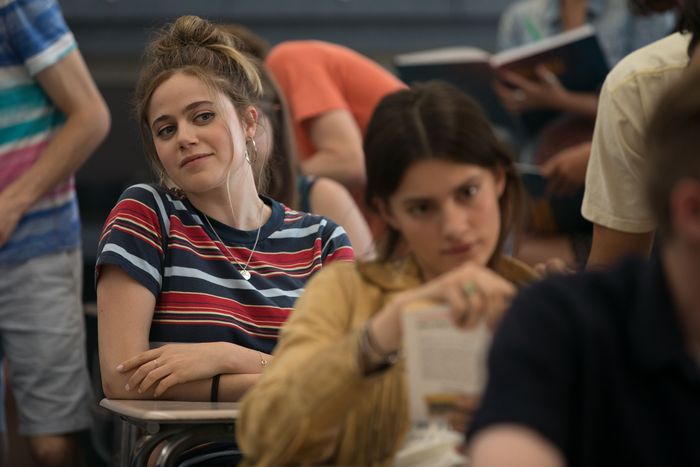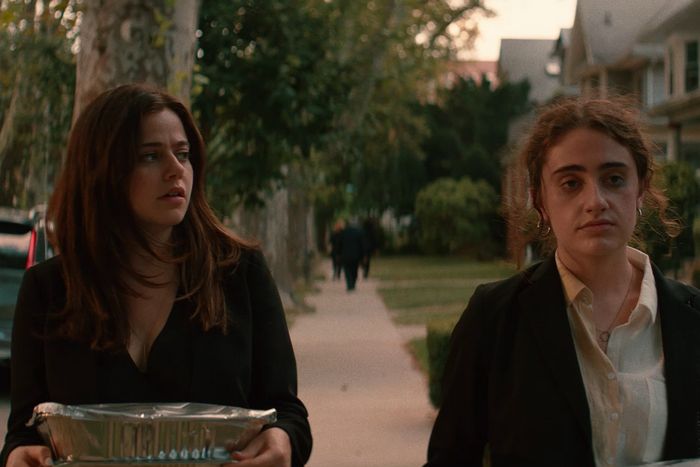
This article was featured in One Great Story, New York’s reading recommendation newsletter. Sign up here to get it nightly.
When Molly Gordon was 11 years old, sitting in the sort of endless high-holiday synagogue service that every Jewish kid on earth has valiantly suffered through, she turned to her father and deadpanned, “I’ve never felt farther from God in my life.” That was one of the last times she can recall being inside a temple. Gordon stayed booked and busy on L.A.’s bar- and bat-mitzvah circuit during her teenage years, occasionally attending “drum circles on Venice Beach” with her family. But for the most part, her attachment to Judaism vibrated on a different, but equally relatable, frequency.
“Being Jewish in West L.A., my religion was watching comedy. That felt like God to me,” she says, laughing, as both of us sip tequila on ice over Zoom on a Wednesday night. Gordon’s holiest tradition involved watching Saturday Night Live every weekend alongside her showbiz-veteran parents, who allowed her to watch the show in increasingly lengthy increments as she got older: first just the opening, then the first sketch, then the singing and Weekend Update. That ritual inspired young Gordon to join the kids’ version of the sketch-comedy group Groundlings, get deeply involved in local productions, and eventually form a sort of unofficial Jewish theater-kid collective with Ben Platt, Beanie Feldstein, and Noah Galvin, who she met in various theater productions over the years. She imagined someday making a pilgrimage to the site of her awakening. “That was my dream,” she says. “I wanted to be on SNL and just get to make a fool out of myself.”
Gordon, 25, has yet to reach that particular holy land. In the meantime, though, she’s spent the last few years making a name for herself as a charismatic, naturalistically funny, scene-stealing supporting actor in a series of studio comedies, including Booksmart, Good Boys, Life of the Party, and Broken Hearts Gallery. Next up, she’s got a substantial supporting role in Shiva Baby, Emma Seligman’s incredibly funny and incredibly stressful debut feature that premieres April 2 and captures the claustrophobic chaos unfolding during a Jewish mourning ritual — an indie, female-centric Uncut Gems, with just as much flop sweat and familial tension but 22 percent more bagels. Rachel Sennott plays the protagonist Danielle, an anxious NYU student who moonlights as a sugar baby and runs into one of her clients at the shiva, while Gordon is perfectly cast as Maya, Danielle’s bemused ex-best friend and ex-girlfriend.
Seligman says she reached out to cast Gordon without an audition. “I’d just seen her in Booksmart, and I thought she was so charming and funny and sassy, but also deeply empathetic,” says the director. “I never know what it means to have a Jewish sense of humor, but she does. I think she’s inherently got a Curb-like, Seinfeld-like sense of humor in her DNA. She’s very quick, and sometimes speaks like a middle-aged woman.”
To that point, Gordon describes her part in the deliriously low-budget Shiva Baby as a “treat,” a word she repeats at least ten times during our two-hour conversation. For Gordon, the size of her role or of the production itself has always been irrelevant; the sheer fact of being able to do what she loves alongside people she likes is the entire point. “I love getting to play a supporting character, coming in and making people laugh, and then peacing out. Some of my favorite actors always exist in that space — getting to just steal a scene,” she says, beaming in her oversize Fiona Apple sweatshirt. “If anyone wants to hire me, what a treat. I’ll do anything.” When I text her after our chat and mention that we might run this story during Vulture’s Character Actor Week, she replies, “Make me the NEXT RICHARD KIND.”
Gordon’s glee at being a supporting performer is a natural extension of the ensemble mentality she carried over from her seemingly idyllic, pseudo-artist-colony childhood. Her parents are the writer-director Jessie Nelson (I Am Sam, Love the Coopers) and TV director Bryan Gordon (Party Down, Curb Your Enthusiasm), and she grew up surrounded by people working in the industry. “I had a very realistic view of what it’s like to be in Hollywood, which is that you have beautiful success, but then years of absolutely nothing where you can’t pay off your house,” Gordon says. Occasionally, she popped up in a scene or two of her mother’s movies, which Gordon says was basically out of convenience and a need for child care: She made out with young Timothée Chalamet in a mall in Love the Coopers and helped Dakota Fanning change costumes between scenes in I Am Sam. But she’s adamant that she wasn’t stage-mommed. “I was so lucky that my family was like, ‘This is just for fun and not for anything else,’” she says. “There was no grooming.”
From the age of 3, Gordon performed alongside Platt in increasingly bizarre local theater productions. “We did, like, Chicago in lingerie when I was in seventh grade,” says Gordon, who also happens to have a lovely singing voice that she’s displayed in various Instagram videos with Platt. Gordon often misdirected her raw natural charisma by turning every single scene into a playful seduction. “The teacher had to pull me aside, because the scene would be like, ‘Hey mom, can we go to the waterpark?’ And I’d be like, ‘Oh, yeah, we can go. What time do you want to go …together?’” laughs Gordon. “It would be like, ‘No, that’s your son.’”
Gordon, who is dyslexic, struggled academically for most of her teenage years, bombing the SATS (unlike her Booksmart alter ego) but finding joyful refuge in making weird art with her friends. She started a group with Platt and Feldstein called the Theater Geeks of America (“the name is something that we all have to sit with for the rest of our lives”), which saw them jazz-handing for the fatigued amusement of various retirement communities. At 18, she headed to NYU, which she says she’d always dreamed of attending in part because of family friend Nora Ephron, who acted as a mentor to her mother: “Nora was quintessential New York to me. She was the smartest, coolest person in the entire world. I just wanted to be her.” But the school felt like a bad fit. Gordon was “really unhappy” and stressed about the steep tuition. She dropped out after two weeks.
She stayed in New York, started working as a hostess at Balthazar — “It was a vibe. The grossest men” — and took UCB and freestanding NYU courses in on-camera acting. She made short films and web series with Platt, Feldstein, and Galvin, which mostly never saw the light of day, and took acting gigs in new musicals that were being workshopped before opening, an opportunity she calls “the best part of being an actor in New York.” The first few agents Gordon met with thought she was too green; when she finally landed representation, she spent months and months auditioning with little success, until she booked a role on TNT’s Animal Kingdom as the girlfriend of the protagonist, a young man newly ensconced in a SoCal crime family run by a tanned matriarch named Smurf (Ellen Barkin).
“Up front, I seem more silly, and that’s where I exist more naturally. But it was fun to try something different; I love a drama,” she says. “I was a Homeland Head in high school. We love mist. We love Carrie frantically typing.” The show took her back to L.A. for several years, but like most theatrical Jewesses hung up on Nora Ephron, she craved a return to the higher-key chaos of New York. “In L.A., you’re stuck in your mood,” she explains. “In New York, you walk by someone and they’re like, projectile vomiting. You’ve got to move through whatever you’ve been feeling.”
In 2018, she landed a role playing the straight man to Melissa McCarthy as McCarthy’s character’s daughter in Life of the Party. Doing jello shots and improvising alongside one of her comedic heroes “was the most fucking fun ever,” says Gordon, who spent most of her free time on the Atlanta set drinking and doing karaoke with castmates Gillian Jacobs and Jessie Ennis. The movie was critically maligned, but Gordon’s low-key performance as a college student who’s essentially nonplussed by her mom’s decision to go to school with her was praised as “very natural.” Her friend Feldstein then encouraged her to audition for a role in 2019’s Booksmart: that of the handjob-loving, SAT-acing, brazenly confident Triple A. Gordon felt like she was totally wrong for the part. “The girls that they cast in those kinds of parts, I don’t look like at all. So I was like, ‘This doesn’t make any sense, but I want to be in this, in any shape or form,’” Gordon says. “I think that’s probably what ended up being good about it — she’s not played by a model who’s like, ‘I’m the hot girl.’ It’s played by me, with my saggy breasts.”
She was finally finding an outlet for the flirty magnetism that once derailed her childhood Groundlings sketches. The same summer she did Booksmart, Gordon filmed another big-budget comedy, Good Boys, in which she’s the closest thing to the film’s villain: an aloof neighbor who chases Jacob Tremblay and his cohorts around the city in pursuit of a baggie of stolen ecstasy. She had a brief guest arc on the show Ramy as the effortlessly chill, molly-popping granddaughter of an Orthodox rabbi who seduces the title character; last year, she was the dry, sardonic best friend in the rom-com Broken Hearts Gallery.
Gordon doesn’t understand, exactly, why she’s been consistently cast as the Cool Girl Who Casually Does Drugs. “I play a lot of sassy, sly people, which is not my personality at all,” she says. “I definitely feel I keep playing people who are not interested in theater; I think that’s how I’d describe them.” Shiva Baby is Gordon’s smallest film yet and her meatiest role: a law-school-bound, queer overachiever who can’t get over her first love (Sennott) despite the fact that said first love is acting insanely. Gordon says the film’s themes spoke to her almost too directly. “It reminded me so much of when I dropped out of school and I would go to family events and people would be like, ‘So, what are you doing?’ I’d be like, ‘Well, I’m working at Balthazar and I’m trying to get a job as an actress,’ and they were like, ‘Well, have you gotten anything?’ I was like, ‘No,’ and they were like, ‘I’m so sorry. Are you really sad all the time? Do you think you’re going to get a job soon if you haven’t booked a job in a while?’” she recalls. “The script [captured] that kind of claustrophobia, of like, ‘Just go away from me, get away.’”
She was also delighted by the ragtag, seat-of-your-pants nature of making it. The indie was shot over 14 days in the summer of 2019 in Brooklyn, with everyone crammed into one sweaty little house, grabbing quick outside coverage without permits, losing actors at the last minute, and getting yelled at by the locals. “It felt like being at camp or something,” says Gordon. “It was just so fucking hot, and we were just all sweating our fucking asses off. I was wearing my old dress from Reformation where, if you sweat in it, it smells like someone shat and then it was lit on fire. But it was so fun because no one had trailers. You work so hard to get to a job, and then sometimes you get there and people are like, ‘I just wish I could go home,’ and you’re like, ‘Wait, we’re so lucky we get to make movies!’ I just want to work with people that are really passionate and aren’t jaded.”
The director, Seligman, was anxious about making her first film; she remembers Gordon constantly checking in on her and making sure she was feeling okay. She was also impressed by Gordon’s ability to project authenticity and humor in scenes where she’s alternately screwball-sparring with Sennott over a shiva plate, making out with her against a brick wall, or eye-stalking her from across a crowded room. “She makes everything her own,” says Seligman. “Whether it’s a comedic line or not, she always just finds a way to make it a Molly line. She’s very instinctual. She’s not a heady actor. It rolls off of her so naturally.”
The pandemic waylaid Shiva Baby’s planned in-person premiere at SXSW last year, though it still seems to be finding its intended audience of queer Jewish women with anxiety issues and light lactose-intolerance who eat cream cheese regardless. Gordon has spent the past year, like many of us, doing very little in-person work. She left New York to ride things out with her parents in Los Angeles; earlier this year, she temporarily moved in with Platt (“He’s kind of like my gay husband; maybe this living together thing will change his mind about the whole gay thing”), with whom she “switched off ordering takeout,” tended to a new puppy, and sang Kacey Musgraves covers (one of which the singer retweeted). Gordon’s also been leaning hard into the “making random shit with friends” energy that’s bolstered her since childhood — right now, she’s making music with her middle school ex-boyfriend and childhood best friend, and writing two screenplays with various other friends. “I love not having to worry about anything to do with me, to flex that part of my brain,” she says. “I just love coming up with things for other people.”
To that end, Gordon is starting to figure out how to ask for what she wants, much in the way that Ephron encouraged her mother to do. “I think it’s still, to this day, hard or embarrassing, to be a woman with intense ambition,” she says, looking, indeed, a little embarrassed. “I remember growing up seeing that in my mom, but also seeing it in Nora, and seeing my mom see that in Nora, and pushing my mom to follow that and not try to silence that at all.” Gordon saw that same quality in Seligman and Sennott: “They’re so unapologetically themselves and really ambitious and push each other to do more.”
Gordon gets uncomfortable when I ask her to define what ambition means for her, her chattiness turning down a degree or two. She will say that she’s long dreamed of mimicking the career arcs of Fred Armisen, Bill Hader, and Kathryn Hahn: “Kathryn, in any role that she has, brings something unbelievable. Even in a silent moment, walking by frame, she makes something out of it. No role is too small for her.” She herself recently started working again, playing Lakers exec Linda Zafrani in Adam McKay’s series about the 1980s L.A. Lakers and “a crazy, kooky” millennial in a lesbian coming-of-age film directed by Tig Notaro and Stephanie Allyne.
And though she’s adamant about adoring her supporting parts, she does admit, near the end of our conversation, that she wants to play bigger roles too. “I think I am very ambitious. I’m still, like, nervous to say that,” she says. “A lot of things I like are more ensemble pieces, but I’d love to be the lead if it came to be. There are unbelievable actresses who are my age. There are always going to be better people for a job. But if it happens to come to me — what a treat.”








